Lord Puttnan talks about the fragility of democracy and how we need to take greater care of it, arguing that we have 'a duty of care' towards it in the same way we have that obligation for all sorts of other things that we cherish and value.
Author: pixel2coding
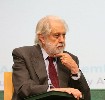
 Click here to view the article.
Click here to view the article.
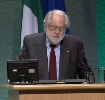
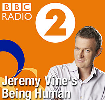
Jeremy Vine explores what makes us human with leading thinkers and writers in this landmark BBC Radio 2 series. Each week a special guest from religion, philosophy, entertainment and sport will deliver their thoughts on the very essence of human existence, reflecting on their own lives.
David Puttnam – Oscar-winning filmmaker, UNICEF ambassador and Labour peer – sees the Olympic spirit as the embodiment of humanity. In conversation with Jeremy Vine.
Click here to download the file.
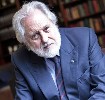
 The venerated film producer Lord Puttnam of Queensgate was in Sunderland on a chilly morning for a masterclass at the University of Sunderland.
The venerated film producer Lord Puttnam of Queensgate was in Sunderland on a chilly morning for a masterclass at the University of Sunderland.
The event (held at the David Puttnam Media Centre) began with the showing of a clip from the BBC's Film 81 in which we saw a youthful Puttnam, fresh from the success of Chariots of Fire, holding forth to the sceptical-looking presenter Barry Norman about the future of media.
With a Steve Jobs-like prescience, Puttnam told Norman that we would soon be entering an age when "television as a piece of technology would be looked at in the same way as the telephone". He correctly predicted that we as viewers would be soon accessing on demand content and that cinema would become, essentially, a way of marketing films that a mass audience would see on TV.
Now aged 72, Puttnam remains as forward-thinking as ever. It's 15 years since he actually produced a movie but his passion for cinema remains. So does his belief that film should inform as well as entertain. In a two-hour session, the producer showed clips of his own and other people's movies, reflecting on a career which has seen him win Oscars, take charge of a Hollywood studio and oversee several of the most celebrated British films of their era.
David Puttnam on performance: the star system, the British stage tradition and American "method"
"One reason stars tend to be stars is that they are very good actors… They tend to deliver a good performance. The second reason they're stars – probably the most important – is that they carry with them on screen our dreams. Unsurprisingly, they're attractive, charming. We want them to be our image of ourselves on screen. (But) I've always believed that the job of the actor once hired, irrespective of whether they're a star, is the degree to which they are prepared to serve the material – the story, the characters. I've always struggled with actors who see themselves as somehow separated from the venture. That's one reason why I've always tried to cast people who had a reality to them.
"On Midnight Express, we had tremendous problems getting the studio to accept Brad Davis. They wanted Richard Gere. If you've got a Gere or a Tom Cruise in a film like Midnight Express, you would expect them to be there at the end. You would expect them to see it heroically through. We actually wanted someone who, two-thirds of the way through, you thought, 'You know what – he is not going to make it!' We wanted to seed that doubt into the audience and we needed an actor who was vulnerable and unknown enough to do that.
"On The Mission, we had Jeremy Irons, classically trained, and (Robert) De Niro. Jeremy would come entirely prepared. He would be word perfect whereas De Niro was used to rehearsing on camera… by take three, it was probably as good as Jeremy would ever be. (But) on take three, De Niro was just limbering up. By take seven, when De Niro was beginning to get somewhere near a performance, Jeremy would get bored. By take 13, when De Niro was delivering a very, very good performance, Jeremy was glassy-eyed!"
On the move from film to digital
"The truth is, I was a child of celluloid and sprocket holes. It was very evident to me that that was going to go to the knacker's yard at some point. I wouldn't say it was an important part of my decision but one of the reasons why it was perfectly helpful to retire when I did is that I went out with sprocket holes!
"I've got a dodgy back. I spent far too many years of my life humping vast cans of film around the world…. Try to imagine if I wanted to show a film in the States to raise some money, I was taking up 20 cans of film on a plane. All of that is in there [points to a USB stick]."
On the opportunity that YouTube gives young film-makers
"The biggest single problem when I was starting out was to prove to anybody you could do anything. Let's go back to the Second World War. If you had any ambition to be a film-maker, your only avenue through was documentary…When you look at the careers of the dominant directors of the late 1950s and early 1960s, they all came from the documentary movement – Karel Reisz, John Schlesinger, John Boorman etc….This is about opportunity – where do you get the opportunity to prove you can actually do it. My generation needed the ability to put film through a camera. The reason that Ridley Scott, Alan Parker and Hugh Hudson used commercials was literally because that was what was available to practice on and prove you have some skills."
On Memphis Belle and why film remains a visual medium
"If you can possibly tell a story minimising the dialogue, you're better off. Cinema, in the end, is a medium of images and music."
On All the President's Men and journalism
"In that scene, you see the insistence of the editorial team, their staff and bosses on two sources, preferably more, and they're pushing for someone to go on the record. There is a very interesting line from [Washington Post executive editor] Ben Bradlee when he says 'Did [President Nixon's Attorney General John N] Mitchell know he was talking to a reporter?' That is a zillion miles away from the practices developed in the UK which is basically about attempting to make a story stand up irrespective of the rules of journalism – the two sources rule, the business of identifying yourself."
On inspiration and Capra's Mr Smith Goes to Washington: the idea that film can inform and entertain
"The challenge of making a film is how do you get across a story you want to tell that contains the values you believe in and is at the same time genuinely entertaining and engaging. I've never had anyone say that Chariots of Fire is a boring film. You look at Local Hero, you're in no doubt about what it is trying to say… I've turned the question around. I've never really understood anyone who has wanted to make a film which is just a series of whizzbang car crashes."
On the generation that fought the Second World War
"My attitude toward that generation that did fight the war is sheer awe. I think they were quite extraordinary people. My whole life, really, has been about trying to justify my generation in terms of my father's generation. I don't think my generation has been as anything like as significant or as bold and visionary. That's why I joined the Labour Party and it's why I believe passionately in the social justice that began to emerge after the Second World War."
Click here to view the article.
Lord Puttnam attended the "21 Years in Images Exhibition" at the college where he served as University Chancellor from 1997 until 2007. Lord Puttnam presided over a period of rapid growth of and change within the University and paid tribute to the city at the event:
"… there is one thing that has remained constant over the past 21 years. It’s the thing that first attracted me to Sunderland – and still does – and that is the university’s wonderful philosophy that everyone with talent, regardless of background, is afforded the opportunity to benefit from a higher education"

Above: Lord Puttnam picture with Sunderland University Vice Chancellor Peter Fidler and Sunderland University Chancellor Steve Cram

"David Puttnam was at the University of Sunderland on March 27th and 28th giving lectures in the Media Centre built during his tenure as the first Chancellor of the University from 1997 until 2007"

At the Cork Person of the Year Award ceremony the titles of Honorary Corkman and Corkwoman were presented to Lord Puttnam and his wife, Patsy. This honor is the first time a couple from outside the county were recognoised for their achievements and contribution to the community.
The couple have been community activists for more than 20 years in West Cork. Speaking at the event, a delighted lord Puttnam remarked: “It’s fantastic to get this. For 24 years I’ve been coming to West Cork knowing I’m a blow-in. Now I feel I’m a de-blow-in!”
The Cork Person of the Year Award recognoises the efforts of those who have made outstanding contributions to their communities over the past year.

Welcoming the fact that Lord Puttnam has agreed to take on the role, Minister Rabbitte said “I have asked David to be an ambassador for digital in Ireland. We all need to be challenged, to be imaginative about how digital technologies and digital media can improve our quality of life, our skills, our health, our education, our employability and our prosperity. Through his careers in cinema, broadcasting and teaching David has always been a genuine champion and early adopter of digital technologies. He is passionate about their ability to positively transform society, for example in education. I am encouraging him to provoke us to think differently about how we use telecommunications in the home, in the wider economy, in learning and in delivering public services to citizens of all ages.”
Commenting on his decision to accept the appointment, David Puttnam said:
- Ireland has been at the forefront in a number of areas of digital adoption…for example in teacher engagement with online resources.
- There is however considerable untapped potential in the digital area…thinking ‘digital’ in all aspects of policy, business, and daily citizen activity, presents huge opportunities, not just for efficiency and effectiveness, but to help unlock the extraordinary creative potential that exists in this, my adopted country.
- I’m delighted to take on this role in Ireland, and to assist in what is a huge and ever more important endeavour – ensuring that society realises the full potential unleashed by the ‘digital world’ and in so doing, becomes that much more connected, inclusive and creative.”
The Minister noted that it is his intention to publish a National Digital Strategy in the New Year, which will highlight the potential of digital to transform society. The first phase of the Strategy will target specific segments of society, aiming to improve digital adoption and realise the economic and social benefits that digital technologies can bring. “The appointment of David as Ireland’s Digital Champion is a key measure under the proposed National Digital Strategy. He has long been an evangelist for digital adoption, particularly in the education sector, and I hope that he will bring his considerable expertise and vision to this important policy initiative”, Minister Rabbitte said.
The appointment of a Digital Champion is particularly timely, as Ireland assumes the Presidency of the Council of the European Union. A number of Member States have already appointed Digital Champions, and it is expected that David Puttnam will address a number of key events during the Irish Presidency, including the Digital Agenda Assembly to be held in Dublin in June 2013.
EU Commissioner Neelie Kroes welcomed today’s appointment of Lord Puttnam, saying “The role of the Digital Champion is to lead, to inspire and to motivate. David Puttnam will do all of this with gusto and flair. His is an inspired choice for this role. I am really looking forward to working with him."
Danny McCoy, CEO of the Irish Business and Employers' Confederation, said, “Digital technologies are the fuel for 21st-century innovation and, given Ireland’s industrial base, we are uniquely placed to utilise these technologies to improve products, services and the way we communicate across all levels of society. The appointment of a person of Lord Putnam’s stature will further bolster Ireland’s internal reputation in this key area and will be warmly welcomed by the business community.'
Welcoming today’s announcement Provost of Trinity College Dublin, Dr Patrick Prendergast congratulated Dr Puttnam on his appointment as an excellent champion in advancing the area. “Digital media and digital technologies have major benefits for society. As a university we are engaging in leading edge research in telecommunications in the national telecommunications research centre, CTVR, at Trinity, in further progressing such technologies and in embedding them in everyday life for the benefit of all. ”
Commenting on the appointment, Dr Anne Looney, CEO of the National Council for Curriculum and Assessment said “This appointment could not come at a better time for Irish education. Having Lord Puttnam as Ireland's digital champion is particularly welcome given his track record in challenging 'chalk, talk and test' models of schooling and leading new and fresh thinking on the future of learning in the digital age”.
Robin Webster, CEO of Age Action Ireland said “Age Action Ireland warmly welcomes the decision to appoint Lord Puttnam as Ireland's first Digital Champion. This will provide leadership in the campaign in raising awareness of the importance of the digital revolution. It will give great encouragement and support to the many community groups helping older people to learn to use computing to benefit themselves, their families and their communities”.
Minister Rabbitte concluded: “In addition to David Puttnam’s outstanding film production record, he has a strong track record in the area of communications, education and digital engagement. These attributes make him an ideal candidate for the role of Digital Champion”. David Puttnam is the chairman of Atticus Education, an online education company based in Ireland, which delivers interactive seminars on film and a variety of other subjects to educational institutions around the world. He is also the present Chancellor of the Open University, following ten years as Chancellor of The University of Sunderland. In 2002, David Puttnam served as Chairman of the UK Joint Parliamentary Committee on the 2002 Communications Bill. A full biographical note is attached, for information.
The appointment of our Digital Champion was marked this afternoon in Dublin at an event in Government Buildings at which the appointment was welcomed by key stakeholders present.
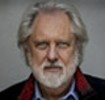
University modules delivered using technology from BT and Cisco
Dublin, Belfast & Cork, August 27, 2012: Lord Puttnam today delivered the inaugural lecture from his home in Skibbereen, Cork, on the very western-most edge of Europe to university students on the other side of the world in Brisbane, Australia – the first stage in a new venture in worldwide online education. Through the innovation and connectivity provided by BT, one of the world’s leading communications and IT services companies; David Puttnam will demonstrate his long standing vision that technology can fundamentally change global education.
 This initiative will see David Puttnam deliver modules to university students outside Ireland from his home using technology that has been enabled and powered by BT and Cisco. The model, known as Atticus Education, is due to be rolled in Asia, the UK and US later this year.
This initiative will see David Puttnam deliver modules to university students outside Ireland from his home using technology that has been enabled and powered by BT and Cisco. The model, known as Atticus Education, is due to be rolled in Asia, the UK and US later this year.
The ten-part seminar series is based on the changing nature of screen production and distribution in the digital era and offers Griffith University Film School students a rare and personal glimpse into his extraordinary career which gave rise to film classics such as The Killing Fields, Chariots of Fire, Bugsy Malone and Midnight Express. His films have won ten Oscars, 25 Baftas and the Palme D’or at Cannes.
This innovative education model is facilitated using a Cisco TelePresence high definition video conferencing solution with high speed internet access provided by BT Ireland’s next generation national fibre and Ethernet network. This allows users to connect face-to-face in high definition while simultaneously being able to access presentations such as PowerPoint, use and send information from a Promethean Whiteboard and view video clips from an external source all while having full internet access.
Lord Puttnam said, “We have been working hard on this model for several years, and I am delighted it has finally come to fruition. We need the world of education and learning to embrace these technologies in ways that make the present rate of progress look exactly what it is – woefully inadequate. My goal is to develop more imaginative education which leverages the immense power of technology and this collaboration with Griffith University is the first step in achieving this.”
Colm O’Neill, CEO, BT Ireland said, “BT Ireland is proud to be part of a venture that is breaking down the barriers to education worldwide. BT’s connectivity and our investment in high quality communications network infrastructure have enabled David to connect to students from a small place like Skibbereen on the edge of Europe to the other side of the world.
“BT Ireland is committed to finding innovative ways to enhance learning through technology, not only through this venture but through the BT Young Scientist & Technology Exhibition, and the BT Young Scientist Business Bootcamp.”
ENDS
Notes to Editor
Lord Puttnam was the first chancellor of the University of Sunderland from 1997 until 13 July 2007. In 1998 he founded the UK’s National Teaching Awards and became its first chairman. He was the founding chairman of the UK’s General Teaching Council 2000-2002. He was appointed as chancellor of the Open University in 2006, the same year as he was appointed Deputy Chairman of Channel 4. He was also the Chairman of NESTA (The National Endowment for Science, Technology and the Arts) from 1998 until 2003. He is chairman of Futurelab and serves on the board of directors of learning technologies company Promethean. In 2009 in partnership with Sir Michael Barber, Lord Puttnam released We Are the People, an education documentary featuring high-profile figures discussing their own experiences of education.
For further information please contact:
Rachel Heron, BT, T: +44 (0) 7789 758580 E: rachel.heron@bt.com
Aidan McLaughlin, Fleishman-Hillard, 01 6188425/ 085 7490484 or
Maria Doyle, Fleishman-Hillard, 01 6188431/ 087 9907831
About BT
BT is one of the world’s leading providers of communications services and solutions, serving customers in more than 170 countries. Its principal activities include the provision of networked IT services globally; local, national and international telecommunications services to its customers for use at home, at work and on the move; broadband and internet products and services and converged fixed/mobile products and services. BT consists principally of four lines of business: BT Global Services, BT Retail, BT Wholesale and Openreach.
In the year ended 31 March 2012, BT Group’s revenue was £18,897m with profit before taxation of £2,445m.
British Telecommunications plc (BT) is a wholly-owned subsidiary of BT Group plc and encompasses virtually all businesses and assets of the BT Group. BT Group plc is listed on stock exchanges in London and New York.
For more information, visit www.btplc.com

